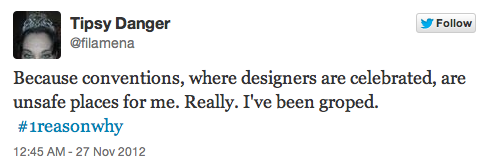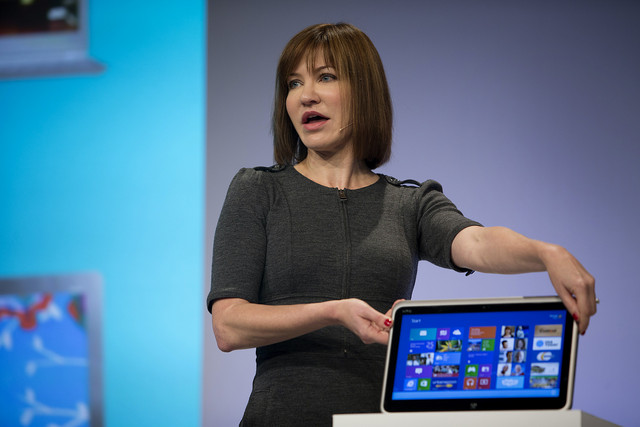Women in games 2013: one step forward, two steps back
Even though it’s now common knowledge that 47% of gamers are women, the gaming industry and geek culture keep struggling to be more inclusive, as 2013 has already had its good share of controversies, tough debates and hateful Tweets regarding gender issues. Here are a few examples I believe are worth noting.
Gender representation: don’t let appearances fool you
The first and most obvious topic that comes to mind when discussing gender in games is that of the representation of women in AAA releases. When not completely absent, female characters are mainly designed to please a straight, masculine audience and the question of their oversexualization is still consistently brought up.
If Tomb Raider’s Lara Croft has often been criticized for her exaggerated measurements, the heroine’s reboot version in the 2013 release could be perceived as a slight improvement :
1996 – 2013
This was counting, however, without the controversy that targeted the game’s direction and marketing, which, according to some, mostly focused on and even sexualized Lara’s bad treatments.
 The game, in the end, brightly illustrated the omnipresent machismo of the gaming culture. In France, for instance, a review happily qualified Tomb Raider as “belonging to the Rape and Revenge genre” and being “rather exciting”.
The game, in the end, brightly illustrated the omnipresent machismo of the gaming culture. In France, for instance, a review happily qualified Tomb Raider as “belonging to the Rape and Revenge genre” and being “rather exciting”.
If proving that Tomb Raider’s content and advertising have willingly promoted any form of sexual assault remains tricky, seeing a (male) journalist describe a rape metaphor as “exciting” is definitely creepy. The cover, I believe, speaks for itself.
“The punishment island – Innocence is over: Lara meets the big bad wolf”
Geek Culture or Rape Culture?
Rape culture seems indeed deeply enrooted in the video game world, sometimes unexpectedly showing up at major conferences, thanks to leading companies’ representatives.
More widely, generalized sexism seems to be the main sickness of the global geek culture. As Twitter user Mar_Lard points out on cafaitgenre.org, a French blog dedicated to contemporary feminist issues, the geek community suffers from the general yet exclusive assumption that the common gamer is necessarily a white, heterosexual, cisgender male.
This assumption seems so widely shared by many gamers that they themselves continue to consider gaming as a “male-only territory”. Some even violently refuse any potential debate on gender issues, as Feminist Frequency Twitt’s outcry about Microsoft Conference illustrates:
A very brilliant answer by a very brilliant man
Women and the tech industry
Among the causes of this sickness, Mar_Lard targets the industry as one of the main responsible, an industry that remains mainly owned and controlled by men.
More generally, it is the place of women in the tech industry as a whole that keeps creating debates, especially after March tech conference’s outcry, where a female developer evangelist used Twitter to denounce what she believed to be a sexist joke, causing the shamer and herself to lose their jobs.
Whether the joke was sexist or not, it is a shame that women’s very presence is still subject to so much tension: being asked why there weren’t more female game creators, Twitter already brought up very enlightening answers in 2012, with women explaining how they feel treated and perceived in the industry.

It gets better…
Yep, it seems that the geek community still has some work to do… Everything is not completely lost though, and if you’re hoping, as I am, that gaming might become more inclusive, here are some small signs that could cheer you up:
 If you feel tired with Lara, you might want to meet Nilin, Remember Me’s avatar, who fights robots with her bare hands in the scary Neo-Paris (don’t expect too much, though).
If you feel tired with Lara, you might want to meet Nilin, Remember Me’s avatar, who fights robots with her bare hands in the scary Neo-Paris (don’t expect too much, though).- Despite Joystick’s lame review in France, a part of the specialized press may have started taking gender issues into account.
- Microsoft’s lack of female protagonists didn’t keep it from naming Julie Larson Green in charge of all hardware devices, games, music, and entertainment.
- Even more progressist it seems, and despite the whole Mass Effect gay controversy, EA insists once more on showing its increasing involvment in LGBT acceptance.
Edit: as my friend Thibaut kindly pointed out, it seems I definitely missed two very-fresh-but-remarkable news concerning gender issues in the tech industry. The first involves dickwolves and a welcomed yet long-to-come apology, the other some serious backlash regarding hilarious sexist apps presented at TechCrunch yesterday.
One step forward, two steps back…

